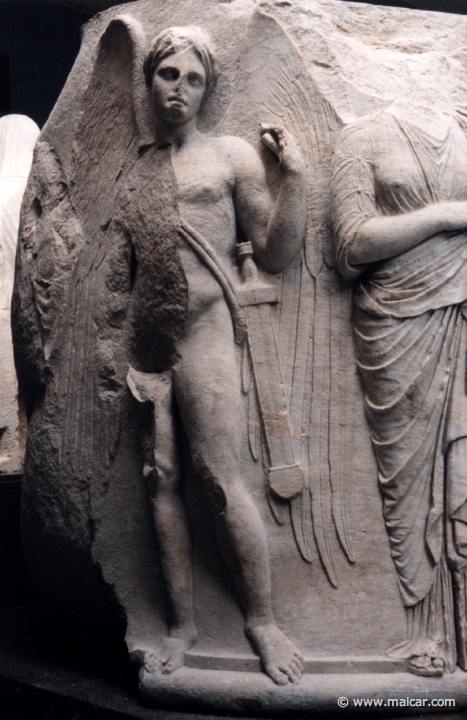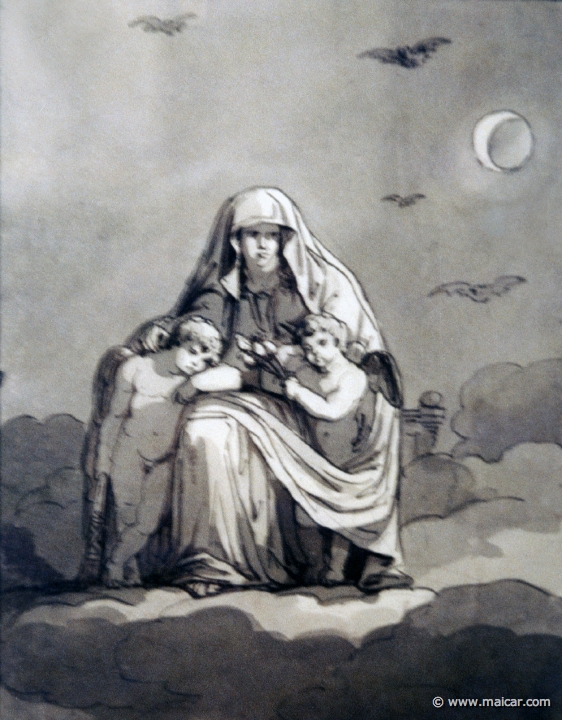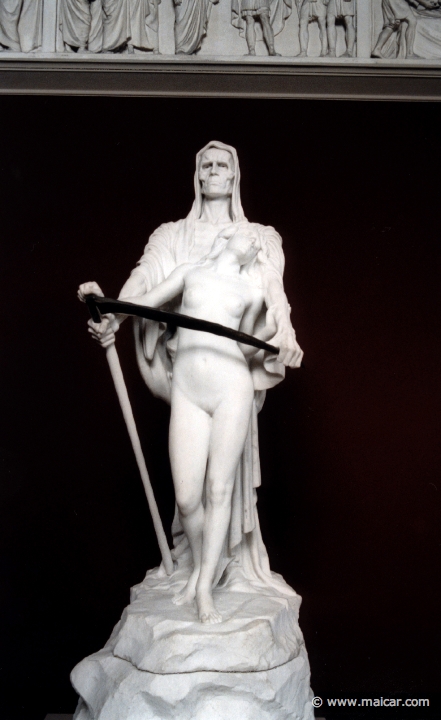|

|
Thanatos (Death, just an ephebe resembling Eros). 8403: Sculptured marble column drum 325-300 BC. Found at the south-west corner of the later temple of Artemis at Ephesos. British Museum, London.
|
|
"Death comes alike to the idle man and to him that works much." (Achilles to Odysseus. Homer, Iliad 9.320).
"Ah, Hector, you have brought utter desolation to your parents. But who will mourn you as I shall? Mine is the bitterest regret of all, for at your death you did neither stretch out your hands to me from your bed, nor speak to me any word of wisdom that I might have treasured in my tears by night and day." (Andromache. Homer, Iliad 24.740).
"Death is the only God that loves not bribes ..." (Aristophanes, Frogs 1393).
"Your thoughts reach higher than the air;
You dream of wide fields' cultivation.
The homes you plan surpass the homes
That men have known, but you do err,
Guiding your life afar.
But one there is who'll catch the swift,
Who goes a way obscured in gloom,
And sudden, unseen, overtakes
And robs us of our distant hopes—
Death, mortals' source of many woes."
(The actor Neoptólemos. Diodorus Siculus, Library of History 16.92.3).
"I win greater honor when the victims are young." (Thanatos to Apollo. Euripides, Alcestis 55).
"Death is a debt which all of us must pay." (Mycenaean women to Electra 2. Sophocles, Electra 1173).
|
Sancho Panza: "No es segador, que duerme las siestas; que a todas horas siega, y corta así la seca como la verde yerba; y no parece que masca, sino que engulle y traga cuanto se le pone delante..." (Miguel de Cervantes, Don Quijote de la Mancha, Segunda Parte, Capítulo XX).
|
|
Sancho Panza: "... he is no mower that takes a nap at noon-day, but drives on, fair weather or foul, and cuts down the green grass as well as the ripe corn: he is neither squeamish nor queasy-stomached, for he swallows without chewing, and crams down all things into his ungracious maw ..." (Miguel de Cervantes, Don Quixote, Part II, Chapter XX).
|
|
|
Thanatos is Death, often remembered as the older
brother of Hypnos, who
imitates him. Thanatos' power only affects mortals,
for the gods, being immortal, cannot be influenced
by him. On account of this, Thanatos endures the
hate of mortals and the immortals' rejection.
The twin brothers take care of Sarpedon 1
These twin brothers, Hypnos and Thanatos, are the swift conveyers who took Sarpedon 1 to Lycia, where his kinsfolk would give him burial with mound and pillar. Zeus had granted his son Sarpedon 1 life for three generations, but his time was up when he came to the Trojan War with an
army of Lycians, and he was killed by Patroclus 1. Zeus then bade Apollo to cleanse the blood from Sarpedon 1's body in the streams of a river, anoint him with ambrosia, and after clothing him about with immortal raiment, give him to Hypnos and Thanatos, so
that they speedily should set him in Lycia, which
they did.
Fates
Thanatos, in bringing death, is often followed
by the fates of death or Keres, who are called
hounds of Hades, and are
Death-spirits, devourers of life. Thanatos, they
say, is subject to the MOERAE, who are the three
sisters who decide on human fate; and as everybody
has a portion in life, the individual fate (moira)
is usually present when Thanatos comes to fetch a
mortal.
Vicarious death
Thanatos may come at any time, but his
intervention in the case of Alcestis, who died a
vicarious death in the place of her husband, is one
of his most memorable. For Apollo had obtained a
special favor of the MOERAE, which was that when Admetus 1 should be about to die, he might be released from death if someone should choose voluntarily to die for him. Thanatos then fetched Alcestis instead of her
husband.
|

|
Nyx and her children Hypnos and Thanatos. 3726: Johann Heinrich Wilhelm Tischbein, 1751-1829: Die Nacht mit ihren Kindern Schlaf und Tod 1790-91. Landesmuseum Oldenburg, Das Schloß.
|
|
Thanatos claims fair play
However, the gods of the Underworld dislike
this curtailing and anulling their prerrogatives,
and consequently Thanatos did not approve of Apollo's manipulations,
and called them trickery. And when Thanatos came to
fetch Alcestis, Apollo tried to persuade
him to wait and grant her a long life. But
Thanatos, being ruthless, refused. Heracles 1, however,
took Alcestis from him
by force, but later, when his own time came, he
could not defend himself:
"For not even
the mighty Heracles escaped Death, dear as he was to Zeus ..." (Achilles to
Thetis. Homer, Iliad 18.116).
Hateful god
Death is hated by mortals, who call him black,
evil, and grievous. For they think that darkness
will enfold them when Death lays his heavy hands on
them. Although Thanatos may come first in Old Age, mortals still call him swift, and his arrival is often regarded as unannounced or sudden, causing even surprise. Yet there are no doubts about Thanatos' coming, and no man knows for certain whether he will still be living the next day.
Help for intimidation
Normally, mortals fear Death, and taking this
fear into account, some among them use Death as an
instrument of intimidation, and turning themselves
into bringers of Death, threaten other mortals with
prematurely sending them to another world. This
behavior is usually caused by disputes concerning
gold, power, sexual satisfaction, or other things
deriving from these three.
Abolition of Death
Threatening to bring Death to others is one of
the most powerful weapons available, for fear of
Death follows the mortal condition. However, if
Death could be abolished by vote, many could be
assumed to prefer the abolition of Death and
thereby live for ever, even to the price of having
to renounce all forms of death-penalty. But the
nature of things is completely different.
Invoking Death
Invoking Death is, when other possibilities are
not available, the method that may be used in order
to obtain a certain behavior from anyone else,
including states. For example, if a certain amount
of gold is not provided, then Death is invoked; or
if obedience is not showed, then Death is invoked.
Similarly, any other satisfaction may be obtained
by invoking Death upon the head of a man, a woman,
or a state. And upon refusal to comply, retaliation
may occur leading to the effective arrival of
Death.
Other things also painful
Some have believed that in such cases the
alternative is not between dying or not dying, but
rather between dying now and dying later. They have
also thought that danger of life or death is not
the only thing deserving regard, but also whether
what is done is goor or bad. For, they reason,
preserving life at the price of performing bad
deeds, may ruin life itself, turning it into a
painful shame. So, as some fear Death, others fear
to live in fear, or are more afraid of slavery and
other similar things than of Death.
Death escapes control
It is said that Death escapes control, and that
the mind should be busy controlling what can be
controlled, disregarding what cannot be controlled;
and so they say:
"I must die:
must I, then, die groaning too? I must go into
exile: does anyone, then, keep me from going with a
smile and cheerful and serene?" (Epictetus, Discourses 1.1.22).
And they add that such a dialog could come up:
"Tell
your secrets."
"I say not a word; for this is under my control."
"But I will fetter you."
"My leg you will fetter, but my moral purpose not even Zeus himself has power to
overcome."
"I will throw you into prison."
"My paltry body, rather!"
"I will behead you."
"Well, when did I ever tell you that mine was the only neck that could not be severed?"
(Epictetus, Discourses 1.1.22ff.).
Fear of Death
|

|
Death, as imagined in later ages. 4928: Elna Borch 1869-1950: Death and the maiden. Ny Carlsberg Glyptotek, Copenhagen.
|
|
Some affirm that Death should not be feared, for
no one knows whether this god brings good or evil.
It has been observed that despite the fact that
nobody knows what Death is, there are those who
act, in court or in other dangerous circumstances,
as if they were to suffer something terrible if
they were put to death; and conversely they act as
if they would be immortal in case they were not
killed. It is also well known that most mortals
experience joyous feelings when they escape Death,
and many among them are prepared to make all kinds
of efforts and sacrifices in order to postpone, no
matter for how little time, the arrival of this
punctual god.
Insincere prayers
Yet the coming of Death may be a joy for those
who are held in great misery and pain, and they may
sincerely say, both in their hearts and aloud:
"Come Death!". However, there are others who
complain beyond measure, praying insincerely for
Death, but once this god comes close, neither life,
nor sickness, nor Old Age seem any longer burdensome to them. That is what
happened to the old man who called Death, wearied
as he was of carrying wood to the city for sale;
and when Death came and asked for what reason he
had called him, the old man, forgetting his
tiredness, hurriedly replied: "That, lifting up the load, you may
place it again upon my shoulders."
Life is short and sweet
And this is so because, in the presence of Death
or under his threat, many find life sweeter than
ever, enjoy looking on the light more than before,
and reason that Death is long and Life short, and
indeed sweeter, much sweeter than they ever cared
to taste, except when Death showed up:
"Sweet is the
sun-god's light, sweet." (Pheres 1 to Admetus 1. Euripides, Alcestis 722).
If to live is to be dead ...
But
"Who knows if
to live is to be dead, and to be dead, to live? And
we really, it may be, are dead; in fact I once
heard sages say that we are now dead, and the body
is our tomb ..." (Socrates. Plato, Gorgias 492e).
If to live is to be dead, if we really are dead,
then our world must be the kingdom of death.
To inhabit such a kingdom means to die
continuously, to be subject to transience, to
agony, and loss. To lead the existence of a shadow
that will soon vanish. To repeatedly watch the
defeat of goodness, the destruction of love and
joy, of beauty and innocence. To go hungry or
thirsty. To be sick or old. To know exhaustion,
fear, anguish, violence or desolation. To destroy
and be destroyed: to be the client of death in
every respect. Confused and wounded, the shadows
wander about their nocturnal kingdom, and from the
openings of their tombs take darkness for light and
death for life. They forget they are shadows, since
they have drunk from the spring of oblivion ... But
sometimes a spark of memory makes them search for
the light of such a dawn as might reveal, beyond
the fields of death, another landscape: a kingdom of life where love has made decay
unknown, and no one ever dies. |